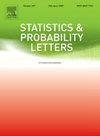薛定谔-福尔摩扩散的弱近似值
IF 0.9
4区 数学
Q3 STATISTICS & PROBABILITY
引用次数: 0
摘要
我们考虑了薛定谔-福尔摩扩散的欧拉-丸山近似的弱收敛性,它是薛定谔桥问题的解,可用于从给定分布中采样。我们证明,在温和的正则性条件下,时间离散化过程的末端随机变量的分布会弱收敛于目标分布。本文章由计算机程序翻译,如有差异,请以英文原文为准。
Weak approximation of Schrödinger–Föllmer diffusion
We consider the weak convergence of the Euler–Maruyama approximation for Schrödinger–Föllmer diffusions, which are solutions of Schrödinger bridge problems and can be used for sampling from given distributions. We show that the distribution of the terminal random variable of the time-discretized process weakly converges to the target one under mild regularity conditions.
求助全文
通过发布文献求助,成功后即可免费获取论文全文。
去求助
来源期刊

Statistics & Probability Letters
数学-统计学与概率论
CiteScore
1.60
自引率
0.00%
发文量
173
审稿时长
6 months
期刊介绍:
Statistics & Probability Letters adopts a novel and highly innovative approach to the publication of research findings in statistics and probability. It features concise articles, rapid publication and broad coverage of the statistics and probability literature.
Statistics & Probability Letters is a refereed journal. Articles will be limited to six journal pages (13 double-space typed pages) including references and figures. Apart from the six-page limitation, originality, quality and clarity will be the criteria for choosing the material to be published in Statistics & Probability Letters. Every attempt will be made to provide the first review of a submitted manuscript within three months of submission.
The proliferation of literature and long publication delays have made it difficult for researchers and practitioners to keep up with new developments outside of, or even within, their specialization. The aim of Statistics & Probability Letters is to help to alleviate this problem. Concise communications (letters) allow readers to quickly and easily digest large amounts of material and to stay up-to-date with developments in all areas of statistics and probability.
The mainstream of Letters will focus on new statistical methods, theoretical results, and innovative applications of statistics and probability to other scientific disciplines. Key results and central ideas must be presented in a clear and concise manner. These results may be part of a larger study that the author will submit at a later time as a full length paper to SPL or to another journal. Theory and methodology may be published with proofs omitted, or only sketched, but only if sufficient support material is provided so that the findings can be verified. Empirical and computational results that are of significant value will be published.
 求助内容:
求助内容: 应助结果提醒方式:
应助结果提醒方式:


